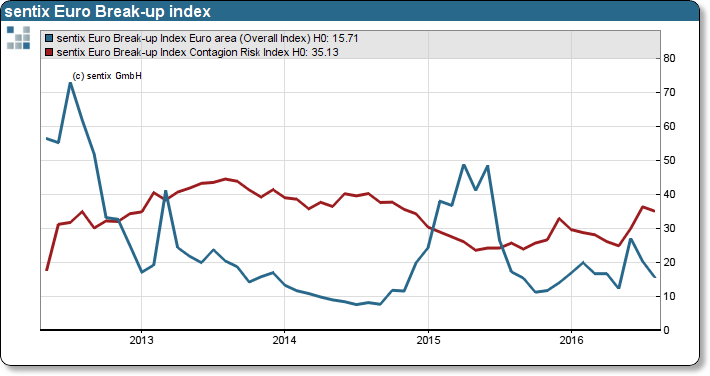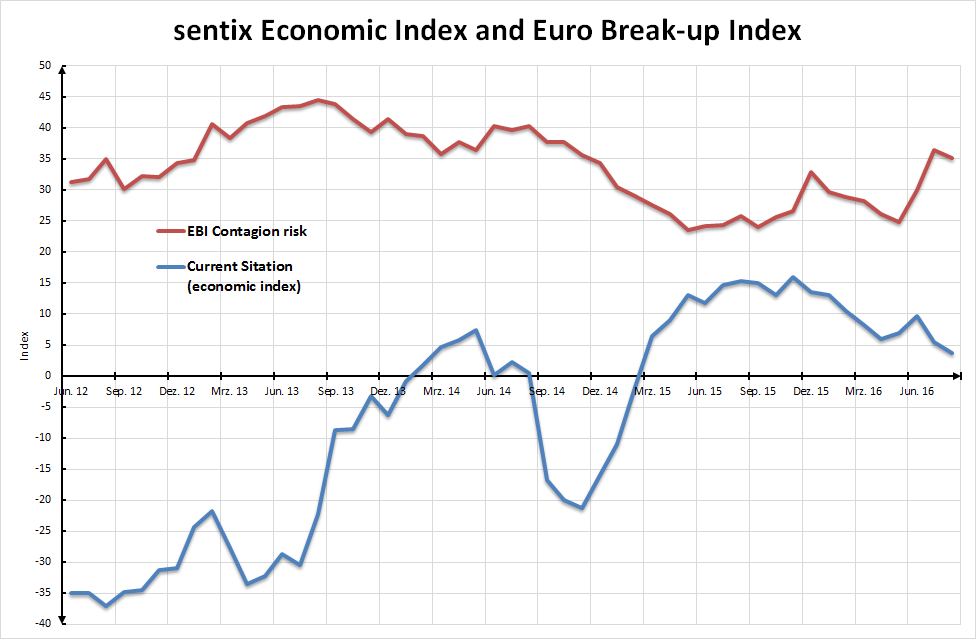|
29 August 2016
Posted in
sentix Euro Break-up Index News
Tensions within the euro zone are easing in August. The sentix Euro Break-up Index (EBI) has fallen -4.6 points to 15.7 points, hence, significantly below the “magic” 20 points threshold. Overall, investors believe that the risk of the euro zone falling apart has decreased as risk sensitiveness for the euro periphery had fallen simultaneously. Only the continuously weak condition of the Italian banking industry, as well as lacklustre economic dynamic in Europe, emit risks.
Positive news first: the situation in the euro zone improves in comparison to the previous month, at least on the surface. The sentix Euro Break-up Index (EBI, blue line) which captures investors’ aggregate perception that at least one member state departs the currency block within the next 12 months, declines to 15.7 points in August, and therefore well below the 20 points threshold. Since the outbreak of the euro crisis, index values above 20 points have demonstrated a high correlation with news about a worsening of the crisis and emergency negotiations. Accordingly, based on the vote of investors this month, an immediate threat to the euro zone is not present anymore. A closer analysis of the respective country risk scores confirms our view: Especially the development of the Greece risk score is pleasant. Investors meanwhile interpret no news about Greece as good news. Correspondingly, the scepticism about Greece’s ability to find a pathway out of crisis has diminished. The EBI country risk index has fallen back to 8.6 points which mark the lowest reading since almost two years. In addition to Greece, risk scores for the Netherlands and Spain have likewise declined after June/July’s sudden jump. Investors perceived level of fear, ignited by the unexpected result of the Brexit referendum at the end of June, has almost entirely receded.
However, despite the positive development in overall risk levels, we still cannot give the all-clear signal. The sentix Contagion Risk Index (red line), which measures the sensitivity that a crisis in a member state could trigger a chain reaction, points towards persistent threats.
Despite that investors perceive that contagion risks have fallen in comparison to last month, the current state of the Italian banking sector continues threatening investors. Meanwhile, the difference between the EBI country risk index for Greece and Italy displays investors’ displeasure with the situation in Italy. The spread between both values has never been that narrow. Also, bond market participants increasingly charge for Italian bonds a higher risk premium over German 10-year BUNDs in comparison to their Spanish counterparts; despite massive intervention by the ECB.
On the macroeconomic level, another issue is apparent: the current situation values of the sentix Economic Index have been consistently falling since the second half of 2015 (blue line), despite ultra-loose monetary policy and “quantitative easing”. We have observed an inverse relationship between investors’ macroeconomic evaluation of the cur-rent situation and the perceived EBI contagion risk (red line). The better investors judge the current condition in the euro zone the lower the level of anxiety that an isolated issue turns into a full-fledged crisis. The human immune system suits as an exemplification: while the immune system is healthy, we seldom get sick. If the immune system is weakened, contagion risks increase.






